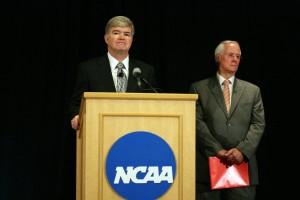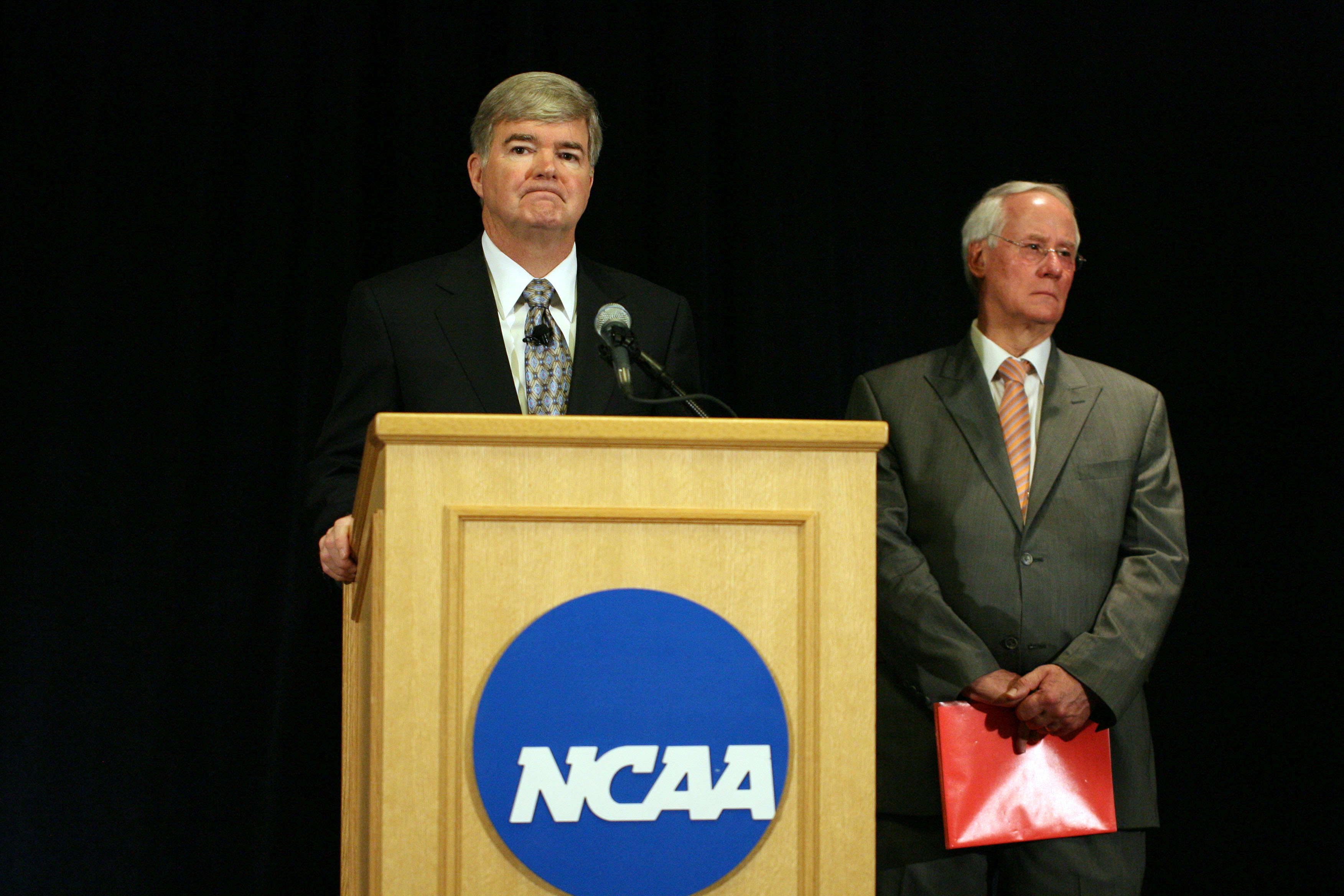The following is a guest contribution from Jay Fragus (@JayFragus). Jay Fragus is an attorney at Sheppard Mullin in Century City, focusing on sports and entertainment law where he counsels clients in various aspects of entertainment and media transactions and in the negotiation of sponsorship and endorsement agreements.
 A four-year bowl ban on post-season appearances.
A four-year bowl ban on post-season appearances.
A $60-million fine levied against Penn State University.
The removal of all of Penn State’s victories from 1998-2011.
A drastic reduction of scholarships over the next four years.
By now, in all likelihood you have heard the main tenets surrounding the National Collegiate Athletic Association’s (NCAA) crippling penalties[1] inflicted against the Penn State football program.
Earlier today, speaking at NCAA headquarters in Indianapolis, Mark Emmert (President of the NCAA) and Ed Ray (Chairman of the NCAA’s Executive Committee), addressed the Penn State issue in a prepared statement. While I agree that the actions (read: inaction) taken by those leaders most able to effectuate change and stop the predatory actions of Jerry Sandusky led to tragic results and abuse, it is important to raise the question of the NCAA’s handling of this situation and caution those as to the dramatic effects of this case on other institutions going forward.
Most concerning is that the NCAA is not adhering to its own existing enforcement processes and procedures. In each case prior to Penn State where alleged violations have been committed, the NCAA has gone through an extensive process, often times lasting more than a year. The dominoes usually fall as follows: the NCAA launches an investigation, after a meticulous and detailed finding the NCAA issues its notice of allegations to the institution, the institution has 90 days with which to respond, a Committee on Infractions hearing is scheduled and finally the Committee issues its findings (normally taking anywhere from just over a month to upwards of a year).
Due process in this case was absent. Rather than launching its own independent investigation, the NCAA issued penalties in response to the Freeh Report, which detailed the repeated failure of high-ranking officials to act responsibly in the handling of the unconscionable actions of long-time assistant football coach, Jerry Sandusky. The NCAA was not deliberative in its actions, and it should be noted that this announcement today came only 11 days after the Freeh report was released.
Also, while the actions (or inaction) of the Penn State leaders at the time is deplorable, and on many levels, incomprehensible, the school’s conduct is not a violation of an existing NCAA rule. This case has nothing to do with the infractions process. Remember, the purpose of the NCAA is to monitor universities and ensure proper adherence to various requirements, including maintenance of proper scholarships and making sure student-athletes are not receiving any impermissible benefits – i.e. preserve a “level playing field”. One will be hard pressed to make any concrete arguments on how this case has anything to do with maintaining a level playing field or argue how Penn State gained any advantages over competitors in recruiting or other common areas associated with football.
In unprecedented fashion, Mr. Emmert and the Executive Committee have used their unilateral authority—a la NFL Commissioner Roger Goodell—in penalizing a school for improper criminal and moral conduct. While I agree that the NCAA is charged with governing college sports (Penn State football included), this extensive and unchecked power in implementing these sanctions are concerning. Punishing Penn State for this type of conduct falls outside a violation of traditional rules and does not fit within the regulations and purpose of the NCAA.
The NCAA’s action in this case leads to a slippery slope for future instances on when and if the NCAA will look to become involved in a matter and, at the very least, sets a bad precedent that the NCAA is willing to circumvent its own rules and act without normal course, changing the way the NCAA handles matters. While the results of the penalties can be debated and questioned as to the appropriateness (for instance, I think reduction in scholarships in this case is wrong), the process and investigation of handing out penalties should not be. The rules are in place for a reason and the NCAA has circumvented their own process and acted outside their scope and reach.
[1] For a full list of the penalties, visit: http://www.ncaa.com/news/ncaa/article/2012-07-23/explanation-penn-st-sanctions

One reply on “The NCAA Acts In An Unprecedented Manner In Implementing Sanctions Against Penn State”
You need to talk to PSU President. He didn’t have any due process concerns. HE voluntarily AGREED to it all, and WAIVED any objection. Also, you fail to mention that this action today by the NCAA is, by its’ explicit terms and by agreement with PSU, only a FLOOR for possible sanctions. The NCAA reserves the right to do more investigation, and bring more charges, through the kinds of “ordinary” enforcement procedures commonly utilized by the NCAA Enforcement staff and COI.